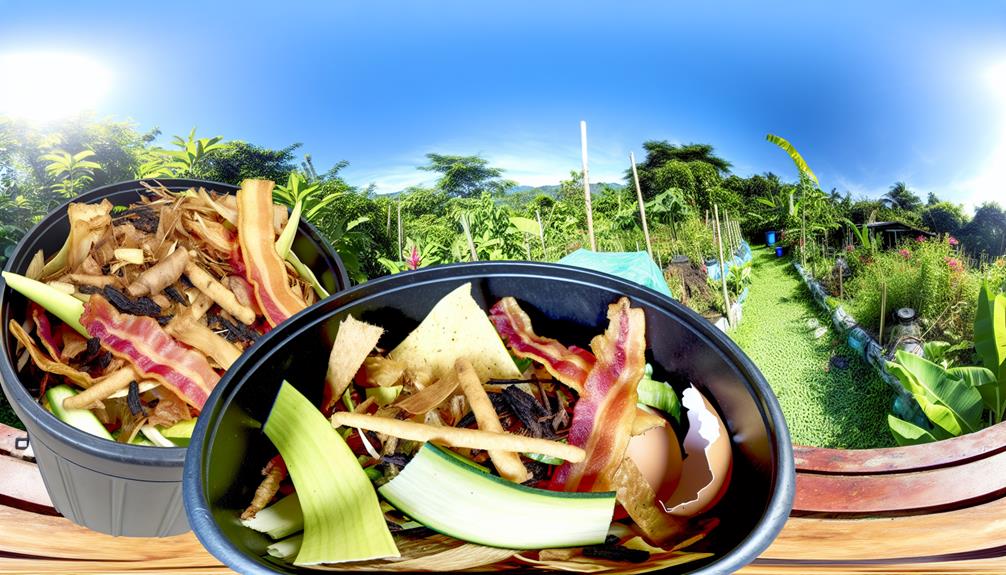

You can compost bacon, but it requires careful attention. Bacon’s high-fat content and salts can attract pests, produce odors, and slow decomposition. To compost bacon safely, cut it into small pieces and mix it with high-carbon materials like leaves or straw. Regularly turn your compost to guarantee proper aeration and maintain a high temperature to kill any pathogens.
It’s important not to add too much bacon at once. Alternatively, repurpose bacon grease for cooking or making candles. Responsible composting reduces waste and enriches soil. For best practices in maintaining your compost’s health, consider these additional tips.
To understand how to compost bacon, you need to first grasp its composition, which includes fats, proteins, and salts. Bacon is primarily made up of pork belly, rich in both saturated and unsaturated fats. These fats can break down but require careful management in a compost pile.

The proteins in bacon, derived from muscle tissue, decompose more readily but can attract pests if not properly handled. Additionally, the salts used in curing bacon can affect the microbial balance in your compost.
When you compost bacon, it’s important to balance these elements with plenty of carbon-rich materials like dry leaves or cardboard. This balance helps to make sure that the composting process remains efficient and doesn’t produce unpleasant odors.
Composting bacon can be tricky due to its high-fat content and the potential for attracting pests. The fats in bacon don’t break down as easily as plant-based materials, causing slower decomposition. This can lead to unpleasant odors, which can attract rodents and insects to your compost pile.
Additionally, the presence of meat can encourage the growth of harmful bacteria, making your compost less safe for use in gardens, especially those growing edible plants. Another challenge is the imbalance it can create in your compost’s nitrogen-to-carbon ratio, important for efficient decomposition.
You need to be cautious and well-informed to manage these issues effectively, ensuring your compost remains healthy and beneficial for your gardening needs.
Despite the challenges, you can safely compost bacon by following a few essential tips and maintaining a balanced compost pile.
First, cut the bacon into small pieces to speed up decomposition. Mix it well with high-carbon materials like leaves, straw, or newspaper to balance the high nitrogen content of the bacon.
Turn your compost regularly to guarantee proper aeration and to prevent foul odors. Avoid adding too much bacon at once, as this can attract pests and create an imbalance in your pile.
Make sure the compost reaches a high temperature, ideally between 130-160°F, to kill any harmful pathogens. By monitoring these factors, you can incorporate bacon into your compost without compromising its quality.
Instead of composting bacon, you can explore other eco-friendly options to minimize waste. One practical choice is to repurpose bacon grease for cooking. It adds rich flavor to various dishes. You can also store bacon grease for making homemade candles or soap. Another option is to use bacon scraps in pet food, ensuring they’re safe for your furry friends.
Here’s a quick comparison of these alternatives:
| Alternative | Benefit |
|---|---|
| Cooking with grease | Adds flavor to dishes |
| Making candles | Eco-friendly and cost-effective |
| Making soap | Natural and aromatic |
| Pet food | Reduces waste, benefits pets |
By responsibly composting, you not only reduce waste but also enrich the soil with valuable nutrients. Composting organic materials like vegetable scraps and coffee grounds reduces landfill waste, lowering methane emissions. This process recycles essential nutrients back into the soil, promoting healthier plant growth.

To compost effectively, maintain a balanced mix of green (nitrogen-rich) and brown (carbon-rich) materials. Turn your compost regularly to aerate it, speeding decomposition. Avoid adding meat and greasy foods like bacon to prevent attracting pests and creating odor issues. Use a compost bin with good drainage and airflow.
More Such Articles To Read:
Can You Compost Cotton Balls? The Shocking Truth Revealed!
Can You Recycle Pizza Boxes? Here’s What You Need to Know!
Eggshell Waste Recycling: Transform Trash to Treasure!
You can compost bacon, but it requires careful handling due to its fat and meat content. Stick to small amounts, bury it deep, and balance it with plenty of browns and greens.
Consider alternatives like vermicomposting for a safer option. Always monitor your compost for odors and pests.
Responsible composting benefits your garden and the environment. Follow these tips to guarantee you’re composting bacon safely and effectively.
